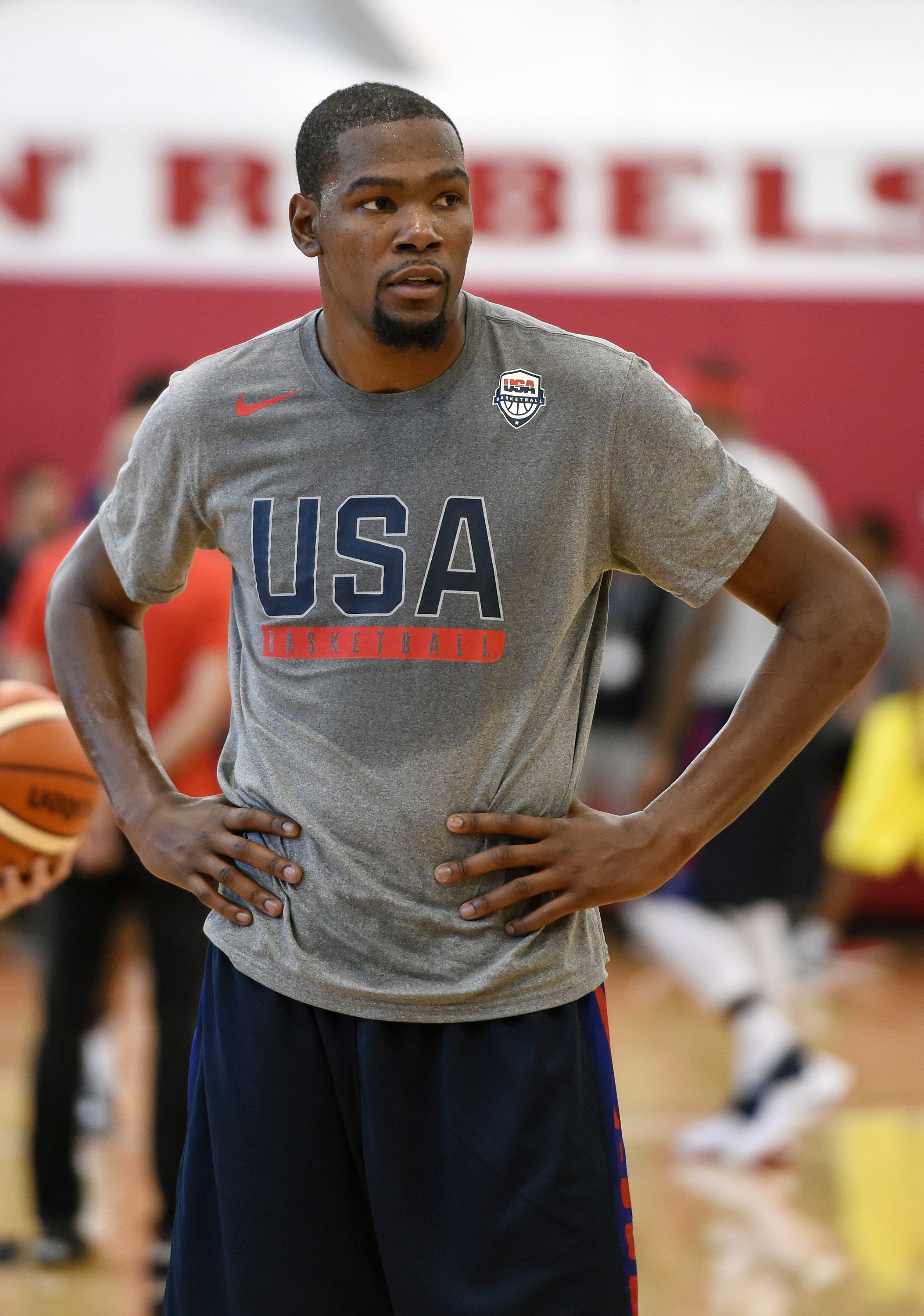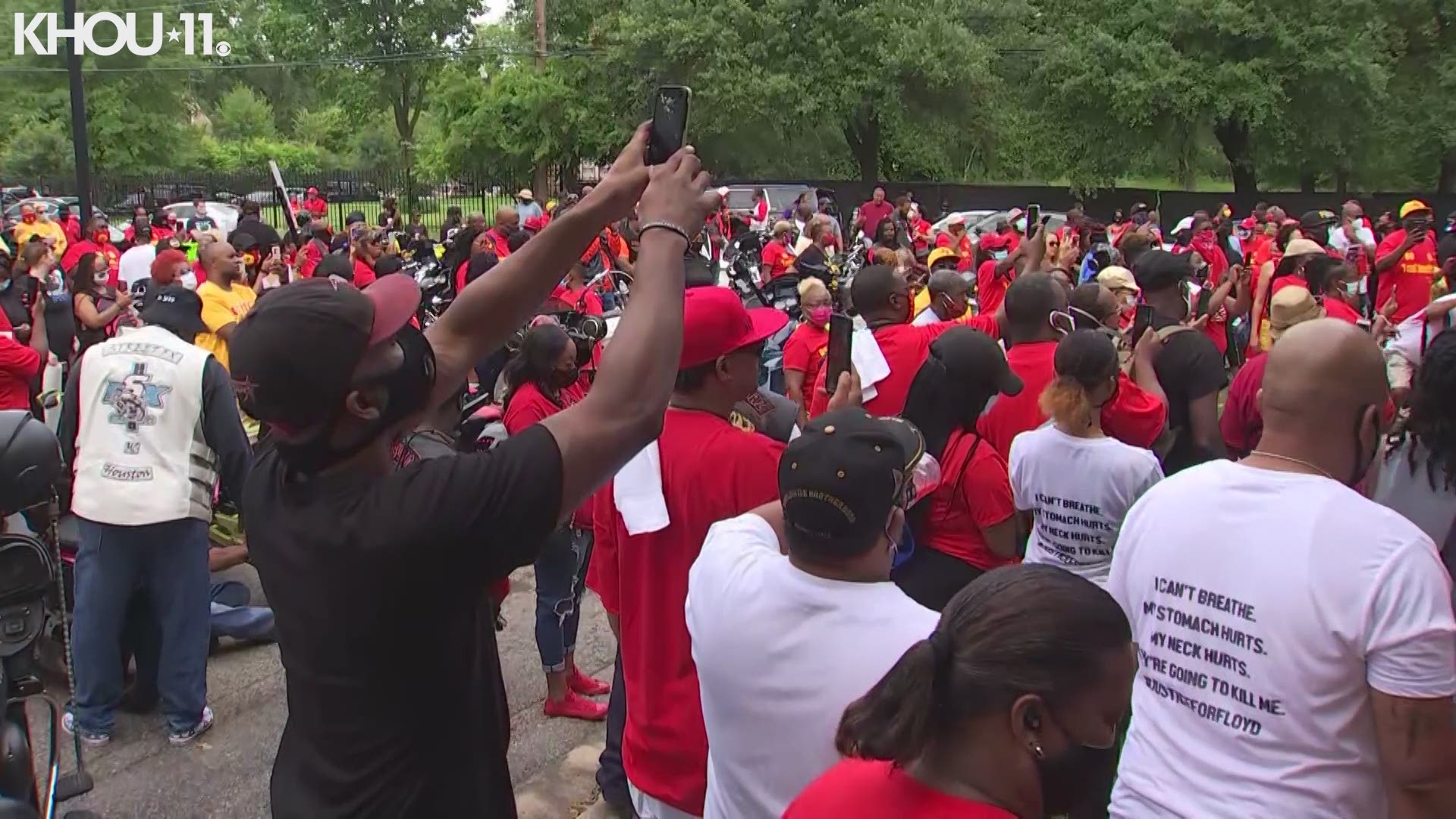LAS VEGAS – Two weeks later, we still didn’t have many answers about Kevin Durant’s decision to leave Oklahoma City behind and form the NBA’s latest super team with the Golden State Warriors.
His introductory news conference in Oakland on July 7 was the kind of controlled spectacle that makes it tough for reporters to dig too deep with the front-and-center subject. And besides, Durant’s head still seemed to be spinning so fast from the magnitude of his move that you could hardly get a real read on what was going on between his ears.
But for 25 minutes on Monday, after the former MVP finished his Team USA duties in the national team’s debut practice inside UNLV’s Mendenhall Center, an engaging and honest Durant offered more clarity on what led to his league-altering move and those fascinating days that followed.
The aftermath
What do you do when you know there’s a storm coming?
You stay inside – and play video games.
That was Durant after his decision on July 4, when he took shelter from the widespread criticism in that rented house in the Hamptons where his family, friends and associates had stayed after his meetings with six teams.
“I didn't leave my bed, because I was like, 'Man, if I walk outside somebody might just try to hit me with their car or say anything negative to me,’” Durant said. “I just stayed in. I was trying to process it all. I wanted to be around family, and positive support. It felt different.
“I mean I've been somewhere for so long and then to make a change like that (which) nobody knew was coming, that nobody didn't think I would do, of course I didn't know how it would be received afterwards. But at some point, I just said, 'Look man, life goes on. Life moves on, and I can't hide forever,' so I just had to face it.”
![Kevin Durant: Chemistry, culture were huge factors in choosing Warriors [oembed : 87276282] [oembed : 87276282] [oembed : 87276282] [oembed : 87276282]](/Portals/_default/Skins/PrestoLegacy/CommonCss/images/smartembed.png)
Yet after two straight days of Xbox action with his younger brother, Rayvonne, Durant emerged to learn that the sun was still shining. There was certainly criticism, though, none louder than the dissenting perspective shared by Charles Barkley and Reggie Miller. But as Durant said repeatedly, it wasn’t nearly as bad as he had imagined – not yet anyways.
“Those are two guys, you know?” he said of Barkley and Miller. “They've got a voice in our game, and a lot of people probably felt the same way but they don't have a voice so obviously what they say is translated through a megaphone so it feels like everybody else (thinks that). If Charles Barkley said it, it must be true. If Reggie Miller says it, it must be true.
“It just feels like it's bigger than what it is. But for the most part, I got the support around me. I've got the family that supports me no matter what, that love me no matter what I do. I could be playing tennis right now, and I could retire from the game of basketball and they're still going to love me. If I think about that, I'll be fine.”
The Russell Westbrook factor
Durant did quite a bit of hand-wringing on this front, denying the notion that chemistry issues with the Thunder point guard led to his departure. But truth be told, what in the world is he supposed to say about this sensitive subplot?
It’s no longer a secret that Durant longed to play the game in the kind of free-flowing way that the Warriors employ, or that he had concerns about the Thunder’s station-to-station style that had them finishing last in the league in passes per game last season – by 11 per game, no less. There was a perceived ceiling placed on his goals with the Thunder, never mind that they had the second best offense in the league during the regular season and came within one game of reaching the Finals.
As one Warriors person had described it even before Durant came their way, there are no hockey assists with Westbrook – the pass that leads to the pass that leads to the shot. More often than not, he’s either scoring on the possession or assisting. All season long, the Warriors’ intel that Durant had grown frustrated with that aspect of his Thunder experience was the root of their free agency confidence.
And with all of that surely in mind, this was his best attempt at addressing the Westbrook situation.
“Nah, it wasn't (a factor in him leaving),” Durant said. “I mean obviously (that alleged subplot is) coming out now (that) I'm gone, all these reports are going to come out. I can't really control it, but I just made a decision based on where I wanted to go, man. It was as simple as that. We can think about all the reasons and the factors and what factored in, but it was simple. That's where I wanted to play basketball.”
![Kevin Durant says Russell Westbrook 'respected' decision to leave Thunder [oembed : 87276308] [oembed : 87276308] [oembed : 87276308] [oembed : 87276308]](/Portals/_default/Skins/PrestoLegacy/CommonCss/images/smartembed.png)
When asked if he had spoken to Westbrook recently after their initial discussion in which Durant shared the news, he said, “No, not really. Not really. Not in depth. But I'm sure that will happen at some point.”
The more revealing part came shortly thereafter, when Durant claimed that he never discussed Westbrook’s uncertain future as part of his decision-making process.
Because Westbrook is a free agent next summer, the widely-held belief was that Durant would want to know whether or not his running mate was likely to remain before picking his team. Alas …
“No, we didn't talk about (Westbrook’s free agency future),” said Durant, who had gone to dinner with Westbrook and Thunder forward Nick Collison in the days leading up to free agency. “I mean we didn't really talk about anything at all. I wish him nothing but the best, man.”
A broken bond with OKC
For all the focus on Durant’s court time with new teammates like Draymond Green and Klay Thompson at Team USA practice, there was another side to that new dynamic. He shared space with some old Thunder friends for the first time since leaving too.
From Oklahoma City media relations man Matt Tumbleson to former Thunder assistant Monty Williams (a Team USA assistant) to recently-acquired shooting guard Victor Oladipo and Thunder trainer Joe Sharpe — there was no shortage of familiar faces. Thunder beat writer Anthony Slater was part of that OKC pack, too, and the Oklahoman newspaper reporter inspired a comical moment midway through when he asked Durant what kind of response he expects to receive in his return to Chesapeake Energy Arena next season.
“I haven't even thought about it, but I'm sure you'll have ... I don't know,” Durant said while pausing. “I'll just wait and see. I mean, what do you think?”
To which I joked that it would all depend on what Slater wrote in the days leading up to the reunion.
“Yeah, exactly,” Durant said with a smile. “They're reading whatever you write, so it's in your control now.”
![Kevin Durant on Oklahoma City: 'Those memories don't erase' [oembed : 87276328] [oembed : 87276328] [oembed : 87276328] [oembed : 87276328]](/Portals/_default/Skins/PrestoLegacy/CommonCss/images/smartembed.png)
Durant, the Seat Pleasant, Md. native who became such a pillar of the Oklahoma City community in his eight years there, spent quite a bit of time discussing the widespread anger from the fans he left behind. It won’t be enough to keep those boos from raining down when he comes back, but it was a wise move to take the high road here.
“Having a chance to play in Oklahoma City for eight years, to see the city come together to support the team, I understand (why they’re upset),” he said. “I understand where they're coming from. It hurt me. I was hurt for a few days because I know that I hurt so many people in Oklahoma City by changing teams.
“Of course they're going to say what they have to say because everybody is emotional, and I understand that ... I can't really say anything to make them feel any different, but just still go out there and be who I am as a basketball player and as a person, and like I said, life moves on.”
![Kevin Durant through the years [gallery : 1834511]](http://www.gannett-cdn.com/-mm-/a6e0c8e2e1952168b1e8db21c71d61c698532c02/c=471-0-3784-2832/local/-/media/2016/07/04/USATODAY/USATODAY/636032305684619516-USATSI-8989036.jpg)
It will move on in Oklahoma City, too, but the what-if factor will never go away. They reached the Finals in 2012, the conference finals four times in six seasons and played so well in the postseason leading to Durant’s departure that Warriors forward Andre Iguodala said after the Cleveland Cavaliers won it all that the Thunder were the best team. In the years between, they endured a seemingly-endless stretch of injuries that ultimately undermined the championship pursuits. To hear Durant discuss the legacy of the team he decided to dissolve was, like the very sight of him wearing a Warriors uniform a few weeks back, nothing short of surreal.
“Time will tell (how those Thunder are remembered),” he said. “We'll see. We had some great years. There were some great players who came there, had two great coaches who (came) through there. The arena was great. The fans were great. So nothing is going to change about Thunder basketball, what they stand on and what the organization stands on is not going to change. That wasn't built by just me. That was the whole community. That was the whole team. That was the whole organization that built what they have.
“We had a great chance. It's hard to win in this league. It's hard to win championships in this league.”
Other Durant quotables
On why he chose not to meet with the Los Angeles Lakers:
“I just didn't. Nothing against the Lakers, but I already had my eyes set on who I wanted to talk to. It wasn't nothing against the Lakers. I really respect their team, but I just felt like they were a couple of years away from where I wanted to be.”
On his meeting with the Boston Celtics and the surprise inclusion of New England Patriots quarterback Tom Brady:
“I was ready to just say, 'Alright let's go. I'm ready to go,' seeing Tom Brady there. Seeing someone so successful at his craft, and just a great ambassador for the game of football and the city of Boston, it was great to be in the presence of greatness. But at the same time, I knew I couldn't let that distract me. (But) he was great. It was great to see him.”
On whether his concerns over the backlash of signing with the Warriors nearly led him to re-signing with the Thunder:
“I thought about (being perceived as the proverbial villain), but in life when you make decisions based on everyone else, I think it's the wrong decision. I can't make a decision on my life because everybody else is going to be upset about it. I just told myself to put me first, to really think about what I wanted, and that's what I wanted. We'll see what happens.”
Durant’s most poignant statement of the day may have been his very last. Having answered every inquiry that came his way, he rose from his chair with a smile and said, “Who's going to give a (expletive) when I'm 49 years old?”
Follow Sam Amick on Twitter @Sam_Amick
![sports-itunes-nba [embed : 71636928]](/Portals/_default/Skins/PrestoLegacy/CommonCss/images/embed.jpg)
![What's next for Russell Wesbrook and the Thunder without Kevin Durant? [oembed : 87275976] [oembed : 87275976] [oembed : 87275976] [oembed : 87275976]](/Portals/_default/Skins/PrestoLegacy/CommonCss/images/smartembed.png)


![GTY 577285936 S SPO OLY BKO USA NV [image : 87275400]](http://www.gannett-cdn.com/media/2016/07/18/USATODAY/USATODAY/636044766303078437-GTY-577285936-83422744.JPG)
